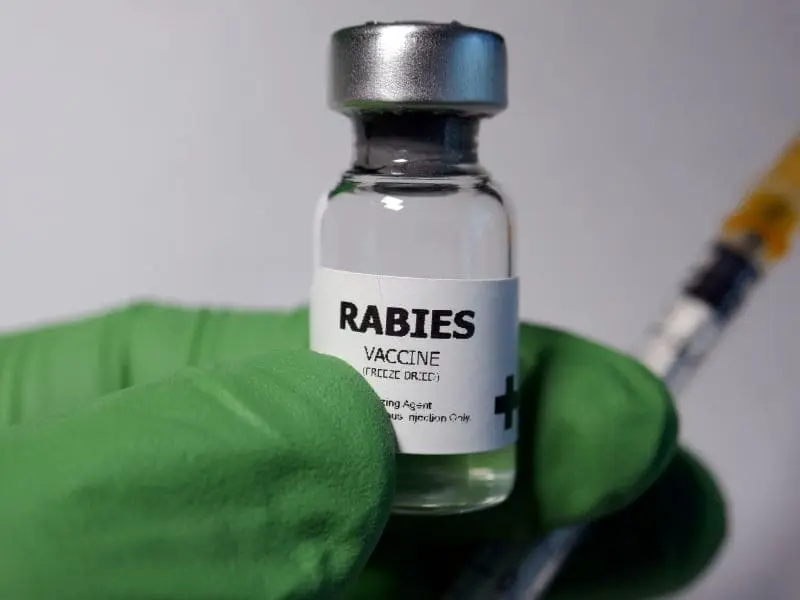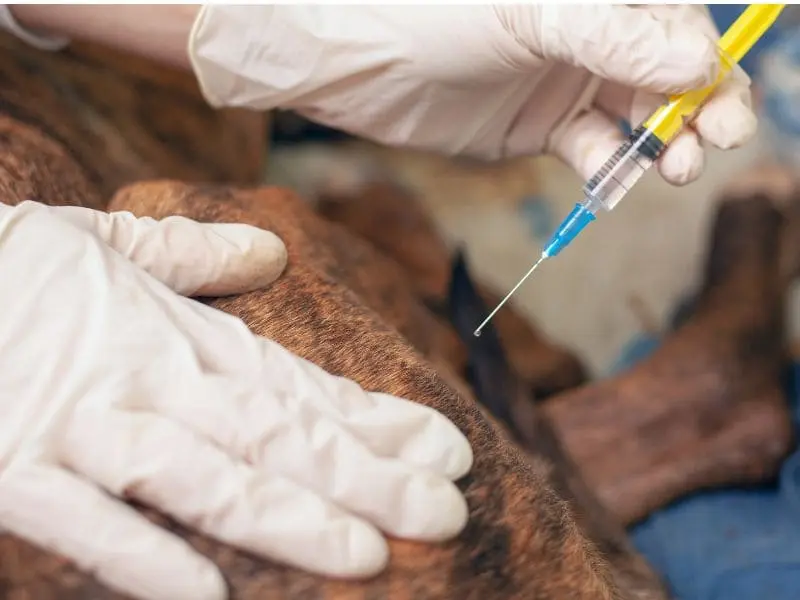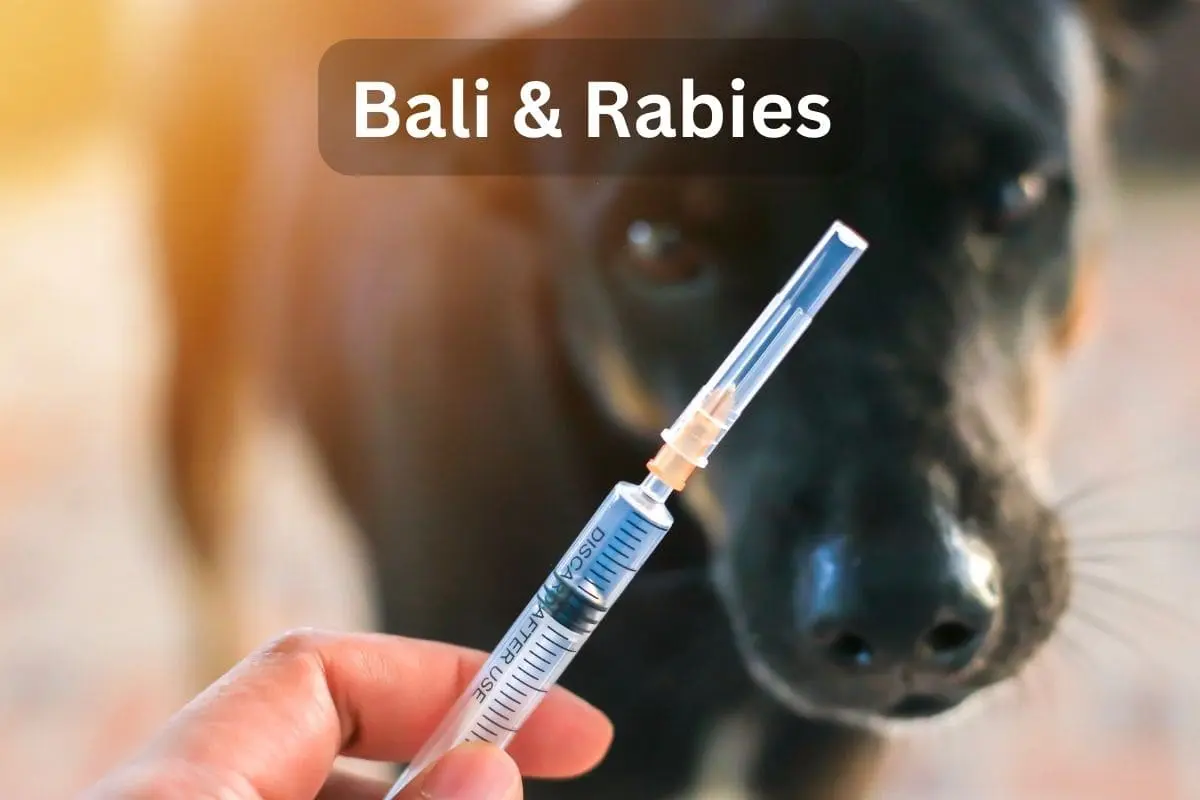I was delighted to hear some of my friend would return to Bali for a vacation. It would be their second time in Bali. This time they had a question about Rabies in Bali. They’ve heard rumors and misinformation from back home, and were understandably worried about the situation with Rabies on Bali. I was happy they reached out to me so I could give them a proper answer. Hopefully for you after reading this you might feel better and can make a informed decision about your vacation or long term stay in Bali.
In this article, we will go through the history of Bali and Rabies, and its current situation. We will discuss how it affects locals, tourists and animals. But most importantly, what measures are being taken to control and prevent it.
What is Rabies and how can you get it?

Rabies is a disease that’s caused by a virus. This virus can cause swelling in the brain. It’s usually passed on when an animal that has the disease bites another animal or a person.
There are many kinds of animals that can get rabies. The most common ones are bats, coyotes, foxes, raccoons, and skunks. In some places in Bali, stray dogs are the ones that have and spread rabies.
You might be wondering about monkeys, especially if you’re planning a trip to Bali. Yes, monkeys can get rabies too. But if you’re going to Bali, you don’t need to worry too much. Not all monkeys in Bali have rabies. In fact, a study that went on for 14 years found no cases of rabies in monkeys in Bali. This study was done by Dr. Agustin Fuentes. (sources: Tripadvisor, Monkey Forrest Ubud Guidelines and Unicare Clinic)
Even so, it’s always a good idea to be careful. Because who knows what happens in the future with monkeys in Bali, will they stay rabies free? When you’re in Bali or any other place, try to keep a safe distance from animals. This is especially important when you’re visiting places where there are lots of animals, like the monkey forests in Bali.
A Look Back: Rabies in Bali
Bali, a paradise island, was once free from rabies. But in 2008, things changed. Rabies was found on a peninsula in the south of Bali. It’s thought that dogs carrying the virus came to the island on fishermen’s boats. (Source: Rabies Alliance)
At that time, Bali didn’t have any plans for dealing with rabies. There were no checks for dog bites, no labs for testing rabies, and no vaccines for dogs.
Despite efforts to control the disease, rabies spread across the island. Emergency vaccinations and culling of dogs didn’t stop the outbreak in 2008-2009. But a mass vaccination program did help. This program reached 70% of dogs, more than 200,000 animals. This led to a big drop in the number of rabies cases.
But the fight against rabies in Bali is not over. The disease is still present on the island. But this is something that is continuously worked hard to control it.
Rabies in Bali: The Current Picture
Let’s now look at the current situation of rabies in Bali.
Since January 2023, Bali has experienced a concerning surge in rabies cases, with over 19,000 new instances reported. This alarming increase has led to the loss of 3 lives between January and early June. The victims did not receive the essential anti-rabies vaccine (VAR). Karangasem Regency has been hit hardest, recording the highest number of cases. To combat the spread, the Bali Health Service has stocked up anti-rabies vaccine doses and is urging the public to vaccinate their pets. (source: Social Expat)
In 2021, nine villages in Bali were identified as ‘Red Zones’ due to the presence of rabies in both stray and community-owned dogs. A total of 12 villages have been found to have rabies transmission in the dog population. These include Peliatan Village in Ubud District, Bitra Village in Gianyar District, and Tampaksiring Village. Nearly all of these villages are located inside Bali’s Gianyar regency.
Bali’s fight against Rabies

Rabies vaccine prices in Bali differ. Some travelers on TripAdvisor mentioned paying high amounts going up to 5000 dollars for the 4 shots. This would mean that locals would not afford it. I can tell you it’s not this high. The cost for the entire 4-shot rabies vaccine regimen is 2,040,000 Indonesian Rupiah ($137) in total in the Ubud Puskusmas (Ubud public health center). The prices differ from hospitals and public health centers. At least you now have an indication how much it cost. The rabies vaccine treatment plan spans 3 weeks. It starts with two shots on day 1, followed by one shot on day 7 and the final shot on day 21. (source: Katie Caf Travel)
Another clinic in Yogyakarta (Klinik Raisha) which provides Rabies Vaccin and Anti Rabies serum. These depend if it is pre or post-exposure. The price for the Serum goes up to 9 Million IDR for 4 shots ($585). This shows the price difference and I would expect the same to happen in Bali depending which Hospital or clinic you go to.
TIP: It is vital to have travel insurance! because when things happen, the costs can quickly build up.
Rabies Concerns Among Bali’s Dog Population
Determining the exact number of dogs with rabies in Bali can be tricky due to the changing number of stray dogs. However, it’s evident that rabies is an ongoing issue, with many dogs still unvaccinated. It’s essential to be cautious and aware.
Bali Government’s Steps to Tackle Rabies

The government is actively fighting against rabies. They’ve launched large-scale vaccination drives and educational programs in collaboration with NGOs like Bali Animal Welfare Association (BAWA) and BARC for Dogs Bali. New rules have been set, making it illegal to let dogs roam free, especially in high-risk areas. Only dogs confirmed to have rabies or showing clear symptoms can be euthanized.
Bali has had some issues with rabies past and present. They are working hard to manage this problem. However, with rabies cases recently, it’s important for everyone to stay updated and careful. For travelers, knowing what’s going on and being safe can help ensure a great trip.
If you’re thinking of visiting, be extra careful around animals, especially in places known as ‘Red Zones’ where rabies is common. This is just near and around Ubud. It’s tempting to get close to Bali’s dogs, but always think of your safety first. Also, it’s a good idea to know about the cost of rabies shots. You might even want to get one before your trip. Remember, staying healthy and safe lets you enjoy all the wonderful things Bali has to offer.
What Tourists Should Be Wary About:
- Animal Interactions: While not all animals in Bali have rabies, it’s crucial to maintain a safe distance, especially from stray dogs and monkeys. Even if an animal seems friendly, it’s better to be safe than sorry.
- High-Risk Areas: Some villages in Bali have been identified as ‘Red Zones’ (near and around Ubud) due to the presence of rabies. Tourists should be extra cautious in these areas or consider avoiding them altogether.
- Vaccination Costs: The cost of rabies vaccination can vary significantly. Tourists should be aware of the potential expenses and consider getting vaccinated before their trip.
What to Do:
- Avoid Stray Animals: Do not pet, feed, or approach stray animals, including dogs and monkeys.
- Seek Medical Attention: If bitten by an animal, wash the wound immediately with soap and water and seek medical attention right away. Even if you’ve been vaccinated, post-exposure treatment might be necessary.
- Travel Insurance: Ensure you have comprehensive travel insurance that covers potential medical expenses, including those related to rabies.
FAQs about rabies in Bali:
Can I get rabies from a monkey in Bali?
While a long-term study found no cases of rabies in monkeys in Bali, it’s still possible. Always exercise caution and avoid close contact with monkeys.
How long after a potential exposure should I seek medical attention?
Immediately. The sooner you receive post-exposure treatment, the better the outcome. Don’t wait for symptoms to appear.
Are there specific hospitals or clinics in Bali recommended for rabies treatment?
The Ubud Puskusmas (Ubud public health center) offers the rabies vaccine regimen. However, many hospitals and clinics across Bali can provide treatment.
Is rabies only present in stray animals in Bali?
No, rabies has been found in both stray and community-owned dogs. Always be cautious, regardless of the animal’s ownership status.
What are the symptoms of rabies in animals?
Symptoms can include aggressive behavior, foaming at the mouth, paralysis, and hydrophobia (fear of water). However, not all infected animals will show clear symptoms.
Can I bring my pet to Bali?
Don’t do this. You will have a problem when you are going back with your pet. likely is that you won’t be allowed to bring our pet out again.
Hi I am Dwi. I am a blogger, travel agent and a mom of a lovely daughter and wife to a supportive husband. I customize and plan tours in Bali and islands nearby for a living and have been doing this for more than 14 years. Get in touch via contact [at] taletravels.com

You’ve done an incredible job addressing the concerns many have about rabies in Bali. Your in-depth research, balanced perspective, and practical advice make this a valuable resource for both residents and tourists. It’s essential for everyone to be well-informed, and your post certainly contributes to that
Thank you for your compliment!